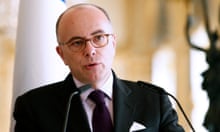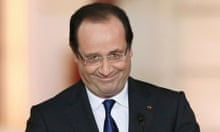The French government has announced a €425m (£326m) programme to combat terrorism, two weeks after a series of attacks left 20 dead, including three Islamist gunmen.
Measures announced by the prime minister, Manuel Valls, include greater surveillance to root out terrorist suspects, hundreds more intelligence officers, gendarmes and police, and better equipment for security services.
Three police officers died in the recent attacks in Paris, which started when gunmen stormed the offices of satirical magazine Charlie Hebdo.
The programme includes measures to prevent youngsters becoming radicalised, the separation of religious fundamentalists in prisons and the prosecution of those who spread or support terrorism on the internet. Constitutional experts are also looking at whether convicted terrorists who hold dual nationality can be stripped of their French citizenship.
Valls, who was flanked by the justice, foreign, interior and defence ministers as he made the announcement, warned there could be no “zero risk” against “determined individuals and well-organised networks”. However, he said the government would fight terrorism with “determination, perseverance and coherent action”.
France has been on its highest security alert since the terrorist attacks that rocked the country and brought millions on to the streets in demonstrations of support for republican values. About 122,000 police and military personnel – including 10,500 troops – have been deployed across France to protect public places.
“We are well aware that the combat against terrorism, jihadism and radical Islamism will be a long battle,” Valls said, adding that French security services had about 3,000 people under surveillance. Among these were about 1,300 French – or foreigners living in France – suspected of links with terrorists networks in Syria and Iraq in the past year. The figure had increased 130% in 12 months, Valls added. Several hundred more were involved in jihadi networks or “cyber-jihadism” on the internet.
“This upping of the [security] level is a tough challenge for our country and our partners, especially those in Europe. It is clear we have to reinforce our cooperation to identify the terrorists and track their movements, as well as reinforce police and legal cooperation with third-party states, particularly those that are transit countries for jihad zones.”
Valls said nearly 2,700 extra people would be employed in the next three years in the war against terrorism, 1,400 in the interior ministry, 950 in the justice ministry, 250 for defence and 80 for the finance ministry, including 70 new customs posts. A total of 1,100 of the new jobs would be in the intelligence services.
The measures would cost €425m over the next three years, with an additional €60m spent over the same time period on attempting to prevent youngsters becoming radicalised. Valls added that France had been hit by terrorism “as it has never been hit before”. “This terrible shock has reminded us of the gravity of the threat which our country faces permanently,” he said.
The prime minister said the battle including addressing racism and antisemitism as well as what he described as unacceptable inequality, a reference to parts of the rundown banlieues with high migrant communities, high poverty rates and rampant unemployment that are seen as breeding grounds for religious extremism. Referring to the rioting that took place in many of these areas in 2005, Valls said: “When you have such high levels of poverty, where people of similar origins live in similar poverty … it’s not a great surprise that these areas become real tinderboxes.
“We are determined to take measures to assure the safety of the French. We are determined to fight against radicalisation … we are determined to restate our values and show in the best way possible that, faced with terror, democracy and the state of law will not give in, will never give in.”






